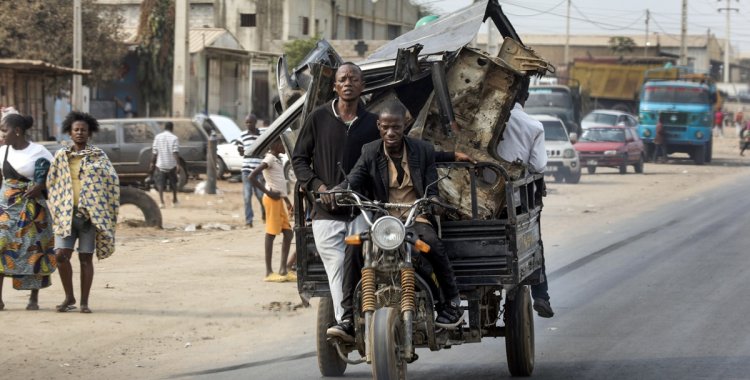In Luanda, scrap dealers buy all types of materials by weight, whether metals such as iron, copper and aluminium or paper and plastic, products supplied by young collectors who camp out around the rubbish bins every day in search of a living.
They deny that they vandalise public property for their own benefit, at a time when the authorities have decided to tighten the siege with greater inspection of establishments and makeshift warehouses in the neighbourhoods of Luanda, which buy this material to resell to metal and/or recycling factories.
The business is mainly run by young people and teenagers, who have become preferred partners of the so-called weighing houses, largely run by citizens from West Africa, who set the price of the goods.
A kilo of iron costs 100 kwanzas, a kilo of aluminium between 400 and 700 kwanzas, depending on the quality, and a kilo of copper, which is more valuable, can reach 2,500 kwanzas.
"We can weigh up to eight kilos of iron per day. Some days we have a lot of iron and others not so much," homeless Minguito André, 18, a scrap metal salesman in Bairro Operário, Luanda, told Lusa.
Sitting with friends around containers in Bairro Operário, an urban district of Sambizanga, Minguito assured that the metals he sells come from his "sacrifice" and not from acts of vandalism.
Collecting scrap metal to sell "is fair work" to ensure food for the stomach and to support other vices, said António Paulo, 17, carrying a bag with a few kilos of scrap.
"We don't steal, we collect this iron right here," said Afonso Paulo, 20, who woke up from his sleep when Lusa arrived at his workplace, which he calls "placa".
Houses and small warehouses for weighing scrap metal are scattered throughout Luanda and some have been closed by order of the municipal administrations, aiming to combat vandalism of public property.
The phenomenon has been gaining worrying proportions and has given rise to the new proposed law on crimes of vandalism of public property and services, with penalties of up to 15 years in prison.
Those that are still in business, run mainly by foreign citizens from Mali, Senegal and Burkina Faso, say that the business can bring in up to one million kwanzas per ton, lamenting the "tightening" of inspections.
"Yes, we have many customers, we receive more iron. After storing the material here, we take it to the factory and sell a ton there for 1 million kwanzas and we can get between four and five tons per month", said Isánio Teixeira, operator of a scrap metal warehouse.
With a semi-industrial scale, Isánio and his colleague Narciso Ambrósio, quite wary of the inspection agents, who have stepped up their presence in these places, have assured that they do not buy stolen material.
"This material is not stolen, they (collectors/sellers) collect it from the rubbish dumps and others buy it from construction sites and then come to sell it", explained Ambrósio, inside a small room where he stores huge quantities of scrap metal.
In Sambizanga, in Marçal, urban district of Rangel, and in Mulenvos de Cima, municipality of Viana, in the capital, some establishments were closed for allegedly encouraging vandalism of public property.
The Municipal Directorate of Inspection and Monitoring of Economic Activities and Food Safety of Viana affixed temporary suspension signs to several locations.
Gomes Domingos Francisco, 25, expressed his sadness at the suspension of activity at the warehouse where he has worked for five years, saying that the establishment did not buy electrical cables, as they were suspected of being stolen.
"Our guarantee is that we will only receive old material, but if they are electrical cables we will not buy them because many are stolen and we do not accept them", he assured, lamenting the suspension of activity, which has penalized the livelihood of 22 heads of families.
Ferrous material is the great preference of the perpetrators who vandalize public property, as reported by the police authorities, to remove manhole covers and gutter grates - which are in short supply throughout the city - electrical cables, fiber optic cables, lamps, high voltage posts and transformer posts.
The new legislation on vandalism, which foresees tougher penalties, is viewed with concern by opposition parties and civil society organizations, who suspect hidden intentions to limit demonstrations and protests, penalizing the organizers.







